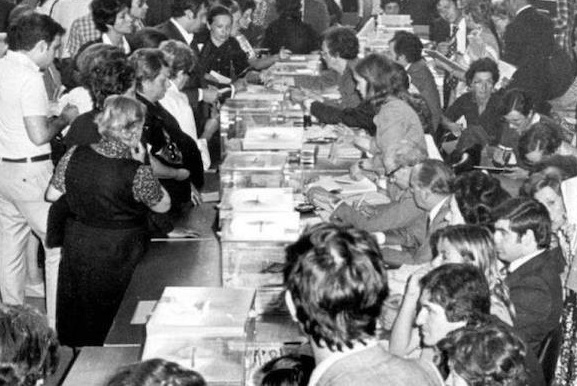The violence and repression of the Spanish Civil War influenced the outcome of the first democratic elections in 1977
The violence and repression of the Spanish Civil War influenced the outcome of the first democratic elections in 1977
The violence and repression of the Spanish Civil War influenced the outcome of the first democratic elections in 1977
A study carried out by Toni Rodon, a professor at the UPF Department of Political and Social Sciences, argues that the effect of repression travels over time when violent actions are perpetrated by clearly identifiable antagonistic actors. The study, which uses a dataset that captures the intensity and type of violence on both sides, concludes that the repression of the Franco dictatorship during and just after the conflict influenced electoral support for the left.

Does violence during a civil war and its aftermath leave a mark on political behaviour in the long term? Under what conditions and in what direction does violence during a civil conflict, by a particular side, subsequently affect how people vote and political participation?
These are some of the questions that research carried out by Toni Rodon, a professor at the UPF Department of Political and Social Sciences, seeks to answer using Catalonia as a case study. The paper focuses on analysing whether the violence perpetrated by the left and the repression imposed by the right during and just after the Spanish Civil War influenced the outcome of and participation in the elections of 1977, the first legislative elections after a dictatorship of more than 40 years.
“Violence turns voters against the side that committed it, and more intense violence on one side or another tilts electoral behaviour against the more violent perpetrator”
In his research, published last December in the journal Conflict Management and Peace Science, Toni Rodon concludes that the effect of repression travels over in time when actions are perpetrated by clearly identifiable antagonistic actors. He determines that “violence turns voters against the side that committed it, and more intense violence on one side or another tilts electoral behaviour against the more violent perpetrator”.
However, the result of this “contrast of violence” shows that the repression perpetrated by the Franco dictatorship during and after the conflict had a positive and significant effect on left-wing support. “Despite the potentially paralysing effect of repression, people affected by repressive events react when a window of opportunity arises, such as the first democratic elections after four decades”, Toni Rodon asserts.
The author’s analysis establishes that while left-wing violence is associated with less support for the political forces representing this side in the 1977 elections, this is largely offset by the notorious effect that the repression perpetrated by the dictatorship has on support for left-wing political forces.
“Red” violence and “blue” repression
Toni Rodon uses a set of data (including an original list of victims that includes a complete census of the repressive actions by the dictatorship) that reflect the intensity and type of violence that occurred in Catalonia. The research design breaks down a large number of repressive actions perpetrated by the left (‘red’ violence) and the Franco dictatorship (‘blue’ repression), such as religious violence, the number of executions, sanctions imposed on teachers, and proximity to mass graves, which are used as indicators.
Quantitatively, in places where Francoist repression (prison, executions, etc.) was 1% higher, support for the left in the 1977 elections increased by 0.7%. “The conclusions are consistent with the idea that in the elections, right-wing repression caused greater support for the forces of the ideological side opposed to the autocratic regime”, Toni Rodon states.
On the other hand, the article finds no support for the idea that violence or repression affected political participation. For the author, one plausible explanation for this pattern is that the 1977 elections were founding elections, with a high turnout.
The “foundational” elections of 1977, ideal for a study that makes outstanding contributions
According to the author, analysing a founding election has a clear advantage: both citizens and political actors generally have little information about and unclear expectations concerning the result. Parties are less likely to form pre-election coalitions or run strategically in certain districts. Consequently, “in this type of election, voters are more likely to vote expressively and ignore the strategic considerations of the parties”.
In the case of Spain, where partisan competition almost perfectly reflected the poles of past victimization, the legislative elections of 1977 “provide an ideal scenario that can contribute information on what could happen in founding elections held in other societies that emerge from a war and that pass from a (violent) conflict to a democratic regime”, the author assures.
Thus, the study contributes to the literature on the relationship between the long-term effects of violence on electoral behaviour; it focuses (unlike most previous works) on a case in which violence does not come from an external actor or from repressive actions perpetrated exclusively by the authoritarian regime, but from two opposing ideological groups. In addition, Catalonia is an adequate field of study, since “it witnessed high levels of violence and repression, both by republican actors and the Franco dictatorship”, Toni Rodon concludes.
Reference work: Rodon, T. (December 2022). “The scars of violence and repression on founding elections: Evidence from Spain”. Conflict Management and Peace Science
